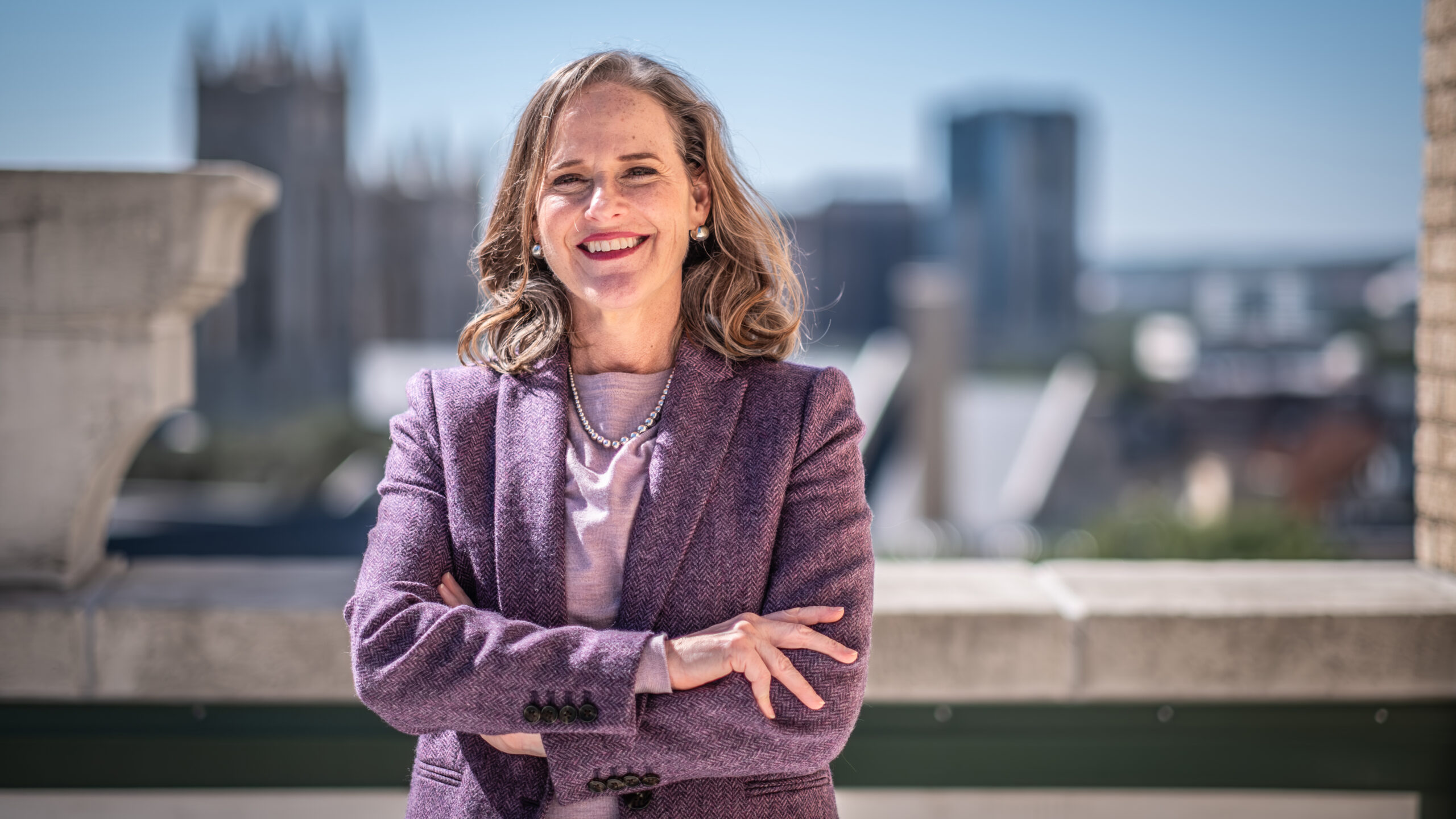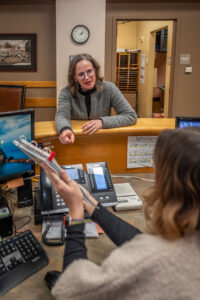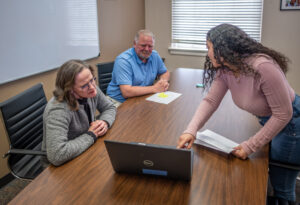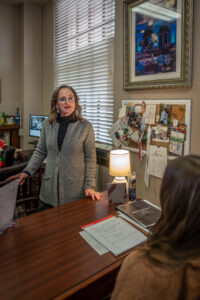
Meet Carol Klocek who is expanding The Center for Transforming Lives
By Linda Blackwell Simmons
Photos by Olaf Growald
Carol Klocek is a leader whose smile captivates, and whose energy motivates — but her work is her destiny. It wasn’t always the case. In her early years, Klocek remembers renting the floor in a closet in a house for $100 per month so she could have a place to sleep.
So close to homelessness herself, Klocek now helps others in that situation as chief executive of Fort Worth’s nonprofit Center for Transforming Lives. She has led the nonprofit for 14 years, overseeing a $20 million annual budget. The center, founded in 1907 as the YWCA Fort Worth & Tarrant County, has helped tens of thousands of women and their children move from homelessness and poverty to a more stable life.
Klocek leads a staff of 175 full-time paid employees and more than 600 volunteers.

The Center for Transforming Lives is preparing to move this fall to a new, larger campus that will allow CEO Carol Klocek, her staff and volunteers to increase the services they provide to women and children in crisis.
“We focus on solving one of the most important social challenges we face today — the growing poverty for young children,” Klocek said.
Meeting Klocek is like following a whirlwind — moving from one project to the next with little downtime.
Although Klocek holds master’s degrees in social work and business, how she grew up is what motivates her. A fifth-generation Fort Worth native, Klocek was the oldest girl in a household of eight children. Parenting responsibilities often fell to her.
“We struggled financially, and it was an unhappy home,” Klocek said. “I wanted a better future, but my parents would not support me going to college. Thankfully, during those years, I babysat for a neighbor who happened to be a nurse at Harris Hospital. I told her about my dreams of living differently than how I grew up, and she taught me the steps to get there.”
During high school at Nolan Catholic High School, Klocek volunteered at a residential treatment facility for children who had experienced abuse and neglect. After college, still struggling to find her footing, she returned to work at the center, where she learned how to care for children and how poverty can harm a child. By 23, she oversaw all residential programs. Wanting to expand her knowledge and future career opportunities, Klocek began working on her advanced degrees.
“While I’d always worked with women and children experiencing poverty, I also worked with homeless populations at The Salvation Army and then the Presbyterian Night Shelter,” said Klocek, who worked for those organizations between 2004 and 2009. “Center for Transforming Lives provides a full-circle experience for me, combining my youth, my education and my work.”
Over 3,500 participants come through the center’s doors every year — with about a 2-to-1 ratio of children to women. While assistance is focused on families led by mothers, the center also serves two-parent households, grandparents raising grandchildren and siblings raising younger siblings. Some are homeless; some are not.
The center’s headquarters at 512 W. 4th St., was once the YWCA building, reminiscent of an era gone by, and has served the organization well over the past years. But with the organization’s growth, space is limited.
Big news came in October 2023 when the center held a groundbreaking event to announce its relocation to 3001 S. Riverside Drive. The new site — called the Riverside Campus — will allow the organization to serve a greater number of Tarrant County’s women and children needing assistance. The campus will repurpose a 1950s-era former Montgomery Ward two-story structure and occupy 14 acres with more than 64,000 square feet. The organization expects to move late this fall.
“This new location will change the entire landscape for us,” Klocek said. “The larger structure will allow us to expand the number of families engaged in housing services, early childhood education, economic mobility work and clinical counseling services. More than 1,000 additional families can be served each year.”

The Center for Transforming Lives significantly expanded services with funds received during COVID, and it won accreditation from the Council on Accreditation in 2022, a national recognition for service delivery.
The center will increase affordable childcare slots to 120 at the Riverside Campus from roughly 70 slots in the current location. Clinical counseling services will more than double the number of clinicians. Housing services will increase, allowing more families to take advantage of transitional housing or rapid rehousing. The center will provide free drop-in childcare to those who are on-site and receiving services. And the center will provide additional space for the Economic Mobility Center, a place that provides training in financial literacy, preparation for careers and small business development.
The organization is working with Bennett Partners, a Fort Worth-based architecture firm, to ensure the new headquarters is designed with women and their children in mind. Bennett is designing the space to foster community and incorporate a welcoming, inspiring and restorative setting. The plan calls for the creation of a tranquil parklike setting.
“In addition to the direct impact that the Riverside Campus will have on the women and children we serve, we are so excited about the broad community impact that the location will have in southeast Fort Worth,” said Scott Lydick, board chair for the center. “The community leaders that have already stepped up to provide their support have been amazing.”
Statistics substantiate the decision to move to a larger facility. The 2020 census in Tarrant County indicates 32% of families headed by a single mother with a child under 5 live in poverty. Over the past 10 years, one in 10 families renting a household experienced frequent evictions in Fort Worth. According to a 2023 study performed by Princeton University’s Eviction Lab, having a young child may place a family at an even greater risk of eviction.
With so many young children experiencing poverty and emotional damage in their early years, many are not ready for school, a critical time for childhood development.
The center uses a two-generational approach by working with the mother and child in all program areas to disrupt the cycle of poverty. Root causes — including lack of housing and childcare, and domestic violence — are addressed. Every effort is made to create sustainable solutions that generate lasting change for children and families.
The nonprofit’s annual budget comes from public funds for essential community services, but it also has a well-diversified flow of funding.
“Both the city of Fort Worth and Tarrant County are remarkably supportive, and individuals, corporations and foundations assist our work with their generosity,” Klocek said. “One hundred percent of the proceeds from our two social enterprises flows back into participant services.”

Carol Klocek: “We are transforming the landscape to say to low-income mothers with young children — we see you; we care for you; we believe in you.”
One of these enterprises is the popular Resale Shop, a thrift store at 6500 Camp Bowie Blvd. Items range from clothing to furniture and appliances. The move to the Riverside Campus will not impact The Resale Shop. And while Historic 512, the organization’s other enterprise, has provided a wedding venue at the downtown headquarters since 1989, what will become of this space will be up to the future owners of that building, which is for sale.
A big boost to the financial stability of the center came at the beginning of the COVID-19 lockdown when the federal Health and Human Services Head Start program awarded it $4.4 million per year for five years. This new funding allowed the expansion of care to include children ages 3 to 5, where previously only children 1 to 3 were covered. The center received accreditation from the Council on Accreditation in 2022, a national recognition for service delivery.
Preservationists may be wondering what will happen to the classic architecture that has housed the downtown building. The good news: it cannot be torn down.
“The building is listed on the National Register of Historic Places, a Recorded Texas Historic Landmark, and also a City of Fort Worth Historic and Cultural Landmark,” said John Roberts, Fort Worth architect and preservationist.
“I feel fortunate that we are able to offer women and children hope and confidence, and perhaps a comfort they have never known — and we have loved performing our work in this artistically crafted building,” Klocek said.
“But we are equally excited about relocating to our Riverside Campus where our work will continue on a larger scope,” she said. “The new location will say to women and children that we are investing in you. We are transforming the landscape to say to low-income mothers with young children — we see you; we care for you; we believe in you.”
